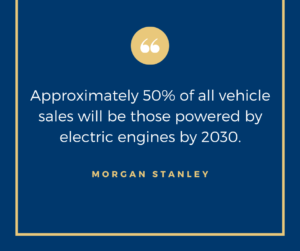Friday, July 2nd, 2021
The Key to Meeting Lubrication Challenges in EV Engines

The electric vehicle (EV) revolution is coming. In fact, it’s already here. Sales of EV were greater than 2.1MM units in 2019, giving a ~ 40% year-over-year increase. This value represented about 2.6% of global auto sales and boosts the total EV global stock to 1%. These don’t sound like big numbers, but they are rapidly growing. In fact, the expectation is that approximately 50% of all vehicle sales will be those powered by electric engines by 2030.
Electric engines require vastly different lubrication than internal combustion engines (ICE). Motor oil, the largest single lubricant in many passenger cars, will no longer be necessary. Instead, the focus will turn to smaller volumes of more specialized lubricants and lubricant additives. Some of the major targets for new EV lubricants are:
- Increased thermal performance – EV engines operate much hotter than ICEs
- Increased anti-corrosion performance – copper (electromagnet winding) will be ever-present in EVs and is often exposed to direct contact by the transmission fluid
- Increased focus on electrical conductivity (ability to adjust as necessary)
- Decreased viscosities
Meeting the lubrication challenges in EV engines will require new base oil technology and new additive technology. Shepherd Chemical has more than a decade of experience in custom lubricant additive development for anti-wear, antioxidant, extreme pressure and friction modifier applications. We are truly excited to use our metal chemistry know-how to design, develop and manufacture the next generation of lubricant additives for the EV market.
If you’d like to learn more, or partner with Shepherd on your next project, please contact us here or call 513-731-1110.